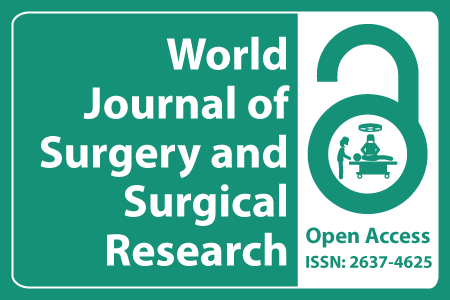
Journal Basic Info
- Impact Factor: 1.989**
- H-Index: 6
- ISSN: 2637-4625
- DOI: 10.25107/2637-4625
Major Scope
- Breast Surgery
- Gastroenterological Surgery
- Hepatology
- Robotic Surgery
- Cardiothoracic Surgery
- Ophthalmology & Eye Surgery
- Vascular Surgery
- Obstetrics & Gynecology
Abstract
Citation: World J Surg Surg Res. 2022;5(1):1383.DOI: 10.25107/2637-4625.1383
The Role of Nitroimidazoles in Preventing Postoperative SSI of Patients with Gastrointestinal Fistula
Tao Zheng, Haohao Xie, Zhiwei Wang, Gefei Wang, Huajian Ren, Zhiwu Hong, Lei Wu, Yun Zhao and Jianan Ren
Department of General Surgery, Ben Q Medical Center, The Affiliated Ben Q Hospital of Nanjing Medical University, China Department of Surgery, The Research Institute of General Surgery, Jinling Hospital, China These authors contributed equally to this work
*Correspondance to: Jianan Ren
PDF Full Text Research Article | Open Access
Abstract:
Background: The efficacy of cephalosporin plus nitroimidazole in preventing postoperative Surgical Site Infection (SSI) is unknown in Gastrointestinal (GI) fistula patients. This study was aimed to evaluate the role of nitroimidazoles in the prevention of SSI after surgery of GI fistula. Methods: A retrospective cohort study of 165 patients undergoing surgery of GI fistula between January 01st, 2017 and December 31st, 2017 was performed. There were 43 patients receiving cephalosporins alone for prophylaxis and 122 patients receiving cephalosporins plus nitroimidazole. The primary outcome in this study was postoperative SSI and risk factors of SSI were analyzed using univariate and multivariable regression analysis. The microbiology of SSI and the incidence of other postoperative complications were also analyzed in this study. Results: Postoperative SSI was observed in 44 patients with overall rate of 26.7%, including 21 patients with superficial SSI, 12 patients with deep SSI, and 11 patients with organ/space SSI. The incidences of overall SSI were respectively 41.9% and 21.3% in the cephalosporins alone group and cephalosporins plus nitroimidazoles group (p=0.009). The types of cephalosporins and nitroimidazoles had no impact on the incidence of SSI. The most common pathogen of SSI in this study was Escherichia coli. The incidences of other postoperative complications showed no significant difference between two groups. Conclusion: The use of nitroimidazoles in prophylatic antibiotics is an effective management to reduce the incidence of postoperative SSI in GI fistula patients.
Keywords:
Nitroimidazole; Surgical site infection; Gastrointestinal fistula
Cite the Article:
Zheng T, Xie H, Wang Z, Wang G, Ren H, Hong Z, et al. The Role of Nitroimidazoles in Preventing Postoperative SSI of Patients with Gastrointestinal Fistula. World J Surg Surgical Res. 2022;5:1383..













